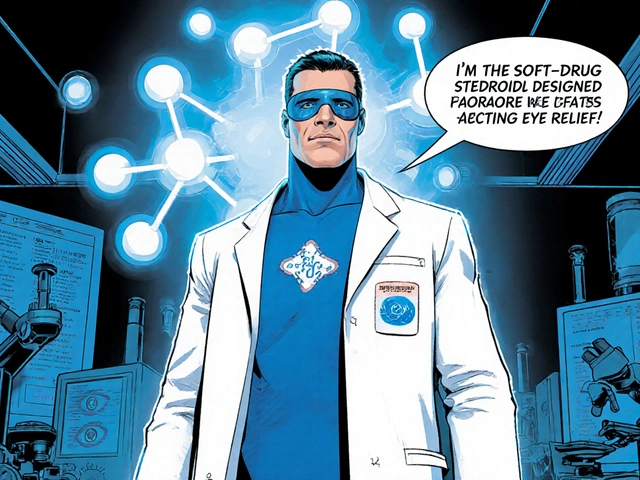Dealing with a burning sensation in the chest? It can feel quite unsettling, right? Often, it’s not as serious as it seems, but it's always good to know what's going on with your body. It might be something as common as heartburn, often triggered by what you've been eating and drinking. Spicy foods, caffeine, and alcohol can all be culprits. But it's also worth thinking about stress levels—yep, stress can also play a part.
If you've got a knack for spicy curries or love a midnight coffee, this might just be the time to reconsider those evening habits. But don't worry, there are simple tweaks that can help cool that burning feeling. Stay tuned as we dive into causes and fixes you can try without even visiting the doctor—though sometimes that's the best bet, and we'll talk about that too.
- Understanding the Causes
- Simple Home Remedies
- When to Seek Medical Help
- Lifestyle Changes for Prevention
Understanding the Causes
Ever wonder why you get that burning sensation in your chest? It's pretty common, and there are a few usual suspects. One of the biggest players is heartburn, which happens when stomach acid makes its way up into your esophagus. This is usually due to overeating, lying down right after meals, or indulging in foods that are spicy or acidic.
Heartburn and GERD
Heartburn itself isn’t an illness, but when it's happening frequently, it might be a sign of something called GERD (Gastroesophageal Reflux Disease). GERD is like heartburn's less forgiving cousin, leading to regular discomfort and requiring some lifestyle changes to manage.
Other Potential Causes
Of course, not every case of chest burning is heartburn or GERD. Stress and anxiety can create some unusual symptoms, including chest discomfort. Moreover, certain medications, especially pain relievers and blood pressure drugs, might have this sensation as a side effect.
- Heartburn: Typically after eating, worsened by lying down.
- GERD: More frequent than heartburn, often accompanied by a sour taste.
- Stress/Anxiety: Can mimic heart-related issues.
- Medications: Check with your doctor if meds could be the cause.
Identifying the Triggers
It's smart to start a food diary or log to help identify what might trigger that uncomfortable feeling. Pay attention to what you eat and how you feel afterward. Pinpointing the cause can often be as simple as noticing patterns, like feeling bad after a hefty pasta meal or drinks with citrus.
If you're ever unsure whether it’s simply heartburn or something more pressing like a cardiac issue, it’s wise to consult a healthcare professional, as that burning sensation can sometimes signal heart problems.
| Trigger | Symptom Frequency |
|---|---|
| Spicy Foods | Often |
| Caffeine | Moderate |
| Alcohol | Occasional |
Simple Home Remedies
Got a burning sensation in your chest but not too fond of rushing to the pharmacy? Sometimes, all you need are some good old home remedies. Let's dive into some effective ways you can tackle that discomfort.
1. Adjust Your Diet
First things first, take a look at what you're eating. Foods known to cause heartburn include spicy dishes, citrus fruits, and fatty foods. You might want to swap that late-night chili for something lighter. Sometimes, just simple changes in meals can help keep the burning sensation at bay.
2. Stay Hydrated
Drinking plenty of water is crucial. It can help flush out irritants and dilute stomach acid responsible for the burn. Aim for at least eight glasses a day to keep everything running smoothly.
3. Elevate Your Upper Body
Ever notice the discomfort is worse at night? Try raising the head of your bed a bit or using extra pillows. This helps prevent stomach acid from traveling back up, which often causes that annoying chest pain.
4. Ginger Tea
This old favorite is not only soothing but also helps reduce inflammation and can ease GERD symptoms. Pop fresh ginger slices into hot water, let it steep, and sip away.
5. Avoid Tight Clothing
Believe it or not, tight-fitting clothes can pressure your stomach, pushing acid into your esophagus. Opt for loose, comfy attire to give your body some room to breathe.
6. Chew Gum
This might sound silly, but chewing gum increases saliva production, which helps neutralize acid. It's a quick fix when you're out and about.
7. Baking Soda Solution
If you're in a pinch, a small dose of baking soda mixed with water might just do the trick. This acts as a natural antacid, temporarily relieving you from heartburn.
These remedies are great for nipping those mild symptoms in the bud. Still, it's key to keep an eye on how often you're experiencing that burning sensation. Frequent occurrences might mean a chat with your doctor is in order.

When to Seek Medical Help
Sometimes, a burning sensation in the chest is more than just a case of heartburn or indigestion. So how do you know when it’s time to see a doctor? Here's a simple breakdown to help you decide.
If Symptoms Persist
If your burning sensation persists despite trying home remedies, it might be signaling something more serious, like GERD (Gastroesophageal Reflux Disease). GERD can damage the esophagus over time if not treated properly. So, if you're reaching for antacids more often than not, it's time to get checked out.
Accompanying Symptoms
Notice any additional symptoms like difficulty swallowing, weight loss, or vomiting? These could be red flags to get professional help. Chest pain combined with severe headaches, dizziness, or sudden weakness could even be signs of a heart-related issue. Don’t wait around—get help fast!
Emergency Situations
If your chest discomfort is accompanied by cold sweats, nausea, or shortness of breath, it's critical to seek medical attention immediately. These are classic signs of a heart attack. Better to be safe and call emergency services instead of ignoring these symptoms.
Data & Stats
According to the British Heart Foundation, around 150,000 heart attacks happen each year in the UK. Knowing the symptoms and acting fast is crucial. Quick response can save lives.
Being attentive to your body’s signals and acting accordingly can make a significant difference. So, when in doubt, don't hesitate to call up your doctor or head to the nearest clinic—it’s always better to play it safe!
Lifestyle Changes for Prevention
Keeping that burning sensation in check might just be easier than you think. Tiny tweaks in your everyday life can make a big difference, especially if you're dealing with recurring issues. Here are some simple lifestyle changes you can adopt.
Watch What You Eat
The food and drinks you're consuming have a direct impact on your chest's wellbeing. Try reducing the intake of spicy dishes that can trigger heartburn. Also, avoid foods high in fatty content which can slow down digestion and lead to acid buildup.
Eat Smaller Portions
Because large meals can put pressure on your stomach, try eating smaller portions more frequently throughout the day. This way, you’re keeping your digestive system from working overtime.
Stay Upright After Meals
Avoid lying down straight after meals. When you lie flat, stomach acid can more easily creep into the esophagus, causing that nasty burning sensation.
Steer Clear of Triggers
Some triggers might be less obvious. Caffeine and alcohol, for example, can irritate the stomach lining. If you're keen on that morning coffee, maybe try switching to a milder tea for a while.
Exercise Regularly
Keeping fit helps maintain a healthy weight, which can prevent unwanted pressure on your stomach. Just remember, don’t work out right after a meal; that’s a recipe for discomfort.
Quit Smoking
Smoking can weaken the muscle responsible for keeping acids in your stomach, leading to frequent GERD symptoms. If you’re a smoker, prioritizing quitting can improve both heartburn and overall health.
Sleep Smart
Elevate the head of your bed a few inches to allow gravity to keep acid down during the night. Sleeping on your left side can also help reduce the chances of nighttime discomfort.
| Change | Benefit |
|---|---|
| Small meals | Less pressure on stomach |
| Avoiding triggers | Reduced episodes |
| Elevated sleep | Better night relief |
These adjustments might seem small, but they can make life with a sensitive chest a whole lot easier. While these tips can help, remember sometimes it’s best to chat with a healthcare professional, especially if things aren’t improving.







Natasha Beynon
July 17, 2025 AT 22:30This guide does a great job of simplifying what can feel like a confusing and scary symptom. Burning sensation in the chest, while often caused by heartburn or GERD, can understandably cause a lot of anxiety.
What I appreciate is the emphasis on recognizing when it's more than just simple indigestion, and when to seek professional help. Sometimes lifestyle changes like avoiding spicy foods or eating smaller meals can significantly help, but if the symptoms persist, a doctor’s visit is crucial.
Has anyone tried natural remedies like ginger or chamomile tea for soothing the chest area after meals? I'd be curious to hear your experiences!
Kevin Cahuana
July 20, 2025 AT 07:04Hey! I totally agree with you about the fear factor when experiencing chest burns. For many, it’s the first alarm bell that something might be seriously wrong.
Apart from diet, I found that reducing stress and not lying down immediately after eating worked wonders for me. It’s amazing how much lifestyle tweaks can influence these sensations. But yeah, being vigilant about symptoms is key.
Also, including a healthcare professional in this conversation early can prevent potential complications down the road. Does anyone else feel like these symptoms get underestimated in daily life?
Amanda Mooney
July 22, 2025 AT 15:37Thank you for sharing such a thoughtful overview on this commonly misunderstood symptom!
Indeed, understanding the root cause of chest burning can alleviate a lot of worry. It’s very empowering when you know whether it’s a simple matter of acid reflux or something requiring immediate attention.
From my experience mentoring people with GERD, the struggle is often in recognizing when the discomfort becomes dangerous. That’s why it’s good to remember some clear red flags like chest pain radiating to the arm or jaw or accompanied by shortness of breath.
Small changes in diet, like limiting caffeine and acidic foods, along with maintaining an upright posture after meals, have also been quite effective. I encourage everyone to keep track of triggers and discuss them with their healthcare provider.
Danielle Ryan
July 25, 2025 AT 00:10Okay but seriously, does anyone else get that feeling where you’re convinced the burning is because of something way scarier? Like your heart is about to give out or you’re having a silent heart attack? It’s not just heartburn, right? There’s always that paranoid voice who’s like, “Hey, maybe it’s something actually fatal and the docs missed it...” Ughhh!
Also–why do these symptoms creep up at the worst possible moments? Like, why can't my chest just chill when I’m trying to relax?! It’s like a malicious prank.
Still, I’m trying to use the tips here but sometimes I wonder if it's my anxiety causing some of this too. Anyone else ever think the burns are from your brain more than your stomach?
Deb Kovach
July 27, 2025 AT 08:44This article covers the essentials very well and I appreciate the focus on practical steps for treatment.
It’s important to remember that while many causes of chest burning are benign, others are more serious and require swift medical evaluation. If chest pain is accompanied by sweating, dizziness, or radiates to other parts of the body, never hesitate to seek emergency care.
For those managing GERD, proton pump inhibitors and lifestyle modifications often bring relief. Yet, communication with a healthcare professional ensures a tailored approach, especially if symptoms persist or worsen.
Has anyone had personal success with particular dietary changes that might help others?
Alex Feseto
July 29, 2025 AT 17:17One must emphasize the critical distinction between benign gastroesophageal discomfort and cardiological emergencies masquerading as a mere burning sensation.
Practitioners and laypeople alike should beware the dangerously cavalier attitude some adopt towards these symptoms. Precisely delineating when to seek advanced medical intervention is paramount and ought not to be underestimated.
On a practical note, the article advances useful advice regarding dietary adjustments and lifestyle changes, yet vigilance remains the highest form of prudence.
Cinder Rothschild
August 1, 2025 AT 01:50I felt compelled to chime in because this topic resonates on such a multifaceted level. Our bodies often narrate their stories through sensations that can be simultaneously vexing and enlightening.
The burning in the chest can be a flamboyant herald of dietary sins such as overindulgence in spicy or acidic whims, or a more subtle whisper of chronic gastrointestinal imbalance. It is a symphony composed by what we consume and how we live.
Moreover, integrating mindfulness and gradual, patient self-care can transform this symptom from a source of dread to an opportunity for deeper attunement with oneself. The knowledge imparted here is not merely a manual but an invitation to listen, to adjust, and to heal.
Oscar Brown
August 3, 2025 AT 10:24This exposition on the phenomenon of chest burning succinctly elucidates the myriad etiologies ranging from benign gastroesophageal reflux to the precarious precipice of myocardial ischemia. It behooves us, therefore, to cultivate a keen observational vigilance.
Parsing the symptomatology with analytical precision, individuals may discern the heuristics of urgency versus benignity. It is an imperative discourse, not only for the lay audience but for the medical cognoscenti who endeavor to disseminate accurate, actionable knowledge.
The articulation on practical remedies is well crafted; nonetheless, the reiteration of timely professional consultation cannot be overstated.
vedant menghare
August 5, 2025 AT 18:57I find this subject to be profoundly important given how chest burning can feel like a tempest within the very core of our being.
Having seen many cultures and traditional healing methods, diet and lifestyle indeed play their crucial role. The fiery feeling often relates to what I call the body's fiery dance between acid and solace.
The article well advises on knowing the difference between the temporary flames of indigestion and the storm warning signs. It is indeed a call to embrace wisdom—not just that of medical science but also the gentle art of listening to one’s own body.
May I ask, what traditional remedies from your own backgrounds have helped soothe these symptoms?
Robyn Chowdhury
August 8, 2025 AT 03:30Honestly, I find articles like these a bit too simplistic, but I suppose it’s useful for someone needing a basic rundown. Personally, the whole ‘burning in the chest’ thing feels more dramatic than it usually is, and most people just overthink it. 🙄
Still, the note about when to seek medical help is valid—I guess ignoring persistent pain isn’t wise.
Would’ve loved more nuanced discussion instead of the usual “avoid spicy food” advice, which, frankly, many ignore and do fine.
Anyway, not bad for a general audience.
😊Sarah Pearce
August 10, 2025 AT 12:04so yeah, this thing about chest burn and stuff is def something ppl shouldnt ignore for long. but sometimes u just wanna pretend its nerves or smth cuz going to doc is a pain LOL!!
idk anyone tried stuff like apple cider vinegar or baking soda? heard mixed things lol its kinda scary tho if it gets worse gotta check tho for sure
i feel like stress makes it worse, like my chest burns mostly when i freak out about it, its a vicious cycle ugh!! yeah def try to eat less junk before bed helped me a little bit tho